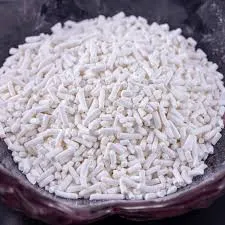
Boiler Water Treatment Solutions and Chemical Options for Optimal Performance
Boiler Water Treatment Chemicals Ensuring Efficiency and Longevity
Boilers are critical components in various industries, including power generation, manufacturing, and heating processes. They function by converting water into steam, which is then used to drive turbines, heat buildings, or support industrial processes. However, maintaining the efficiency and longevity of a boiler system requires meticulous treatment of the water within. This is where boiler water treatment chemicals come into play.
Boiler water treatment involves the addition of chemicals to the feedwater or the steam condensate to prevent corrosion, scaling, and other water-related issues. These issues can lead to significant operational problems, including reduced heat transfer efficiency, increased energy consumption, and costly breakdowns. The proper application of treatment chemicals not only enhances performance but also extends the life of the boiler system.
One of the primary problems faced in boiler operations is scaling. When water is heated, dissolved minerals such as calcium and magnesium can precipitate out, forming a hard deposit on heat transfer surfaces. This scale acts as an insulator, significantly reducing efficiency and causing overheating, which can lead to damage. To combat scaling, chemicals known as scale inhibitors are employed. These compounds, including phosphate and polymer-based treatments, help to keep minerals suspended in the water, preventing them from forming deposits.
Another crucial aspect of boiler water treatment is controlling corrosion. Corrosion can occur when water interacts with metal surfaces, leading to pitting and eventual failure. To mitigate this risk, oxygen scavengers like sodium sulfite or hydrazine are added to the boiler water. These chemicals effectively remove dissolved oxygen from the water, significantly reducing the potential for corrosion. Additionally, alkaline agents such as sodium hydroxide help maintain a proper pH level in the boiler water, further protecting metal surfaces.
boiler water treatment chemicals

Aside from scaling and corrosion, carryover is another concern affecting boiler efficiency. Carryover occurs when impurities and water droplets are carried into the steam phase, leading to potential damage downstream. To minimize this issue, foaming agents can be introduced to reduce surface tension, preventing the formation of bubbles that carry impurities into the steam. Furthermore, maintaining proper water levels and implementing effective separation techniques can help mitigate carryover risks.
In certain cases, boiler water treatment chemicals also serve to manage biological growth within the system. Bacterial growth can lead to sludge formation, contributing to fouling and operational inefficiencies. Biocides are introduced to control microbial growth, ensuring clean and efficient operations. It is essential to choose biocides that are compatible with the boiler and do not negatively impact the quality of steam produced.
Regular monitoring of boiler water chemistry is vital for the effective application of these chemicals. Parameters such as pH, conductivity, total dissolved solids (TDS), and specific ion concentrations should be routinely tested to adjust treatment programs accordingly. Many facilities invest in automated monitoring systems to ensure optimal chemical dosing and compliance with industry standards.
In conclusion, the application of boiler water treatment chemicals plays a pivotal role in maintaining the efficiency and longevity of boiler systems. By addressing scaling, corrosion, carryover, and microbial growth, these chemicals help industries minimize operational risks and reduce maintenance costs. As boiler technology continues to evolve, ongoing research and development in treatment solutions will be essential in meeting the challenges of modern boiler operations, ensuring safe and efficient steam generation for years to come.
-
Buy High-Quality Trichloroisocyanuric Acid for Sale | TCCA 90% SupplierNewsAug.30,2025
-
Pure Sodium Dichloroisocyanurate Dihydrate | Powerful DisinfectantNewsAug.29,2025
-
Industrial Chemicals: Quality & Purity for Every IndustryNewsAug.28,2025
-
Nitrile Rubber Honoring Strict Production StandardsNewsAug.22,2025
-
Aspartame Ingredients Honoring Food Safety ValuesNewsAug.22,2025
-
Fertilizer for Balanced Plant NutritionNewsAug.22,2025
-
Cyanide Gold Processing with High Purity AdditivesNewsAug.22,2025
Hebei Tenger Chemical Technology Co., Ltd. focuses on the chemical industry and is committed to the export service of chemical raw materials.
-

view more DiethanolisopropanolamineIn the ever-growing field of chemical solutions, diethanolisopropanolamine (DEIPA) stands out as a versatile and important compound. Due to its unique chemical structure and properties, DEIPA is of interest to various industries including construction, personal care, and agriculture. -

view more TriisopropanolamineTriisopropanolamine (TIPA) alkanol amine substance, is a kind of alcohol amine compound with amino and alcohol hydroxyl, and because of its molecules contains both amino and hydroxyl. -

view more Tetramethyl Thiuram DisulfideTetramethyl thiuram disulfide, also known as TMTD, is a white to light-yellow powder with a distinct sulfur-like odor. It is soluble in organic solvents such as benzene, acetone, and ethyl acetate, making it highly versatile for use in different formulations. TMTD is known for its excellent vulcanization acceleration properties, which makes it a key ingredient in the production of rubber products. Additionally, it acts as an effective fungicide and bactericide, making it valuable in agricultural applications. Its high purity and stability ensure consistent performance, making it a preferred choice for manufacturers across various industries.





